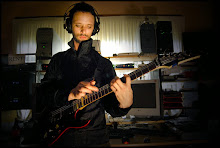Forum – Week 2 – Semester 2, 2008: “My Favourite Things I”
Terra Rapta was an interesting experience – I was looking forward to listening to it again, without the score to distract my ears, but this did not eventuate. I find score reading an annoying task with music at this level. I can’t read quickly enough to follow the score in any meaningful way so it doesn’t really do much for me. At the end of the day, if I were not planning to play the piece myself I’d rather just close my eyes and listen. I did this with the Schubert Quartet, as the scores were so small that sharing between three was a pointless task anyway. When will these lecturers discover the wonders of a laptop computer, Power-Point and a portable projector?
The Grainger quartet did a remarkable job with Harris’ piece (I’m not sure if it was them in the Schubert recording, but an equally fine performance if so). However, It’s difficult for me to listen to a small classical ensemble and not notice some effects that the musicians are attempting to achieve falling a little flat as a result of the limited medium for sound production that they are using. It’s less noticeable with a full orchestra, but modern electronic instruments are undoubtedly superior at achieving wide ranges of sonorities.
Reference:
Whittington, Stephen. "Forum – Week 2 – Semester 2, 2008: My Favourite Things I.” Workshop presented in room 1107, level 11 Schultz building, University of Adelaide, 7th of August 2008.
Labels: Forum IIIB



7 Comments:
QUOTE: "I was looking forward to listening to it again, without the score to distract my ears, but this did not eventuate."
I usually follow the score for a little while, then think "that's interesting" and then just focus on the sound. Funny that we spend more time "looking" at music than listening...
The things we do in the name of objectivity
I do try, but when the tempo's really slow, the time signature changes often, and there are lots of tied notes and obscure chords to read, my mind just seems to say: "Well you can go there, let me know how it all pans out"...
I only just noticed, that is one insane looking score you posted there. That I would be interested to hear!
modern electronic instruments are undoubtedly superior at achieving wide ranges of sonorities
F**k you.
Ben, in light of your emotionally driven, yet intellectually stimulating comments regarding my views on 'old school' acoustic instrumentation in the world of new music, I feel some clarification is needed on my part. What I am expressing is my core belief that orchestral instruments are usually best suited to producing that which they were invented for. There are exceptions to this of course but for the majority of modern pieces I've heard in which composers attempt to create new 'special effects' with these instruments the result is almost invariably contrived and underwhelming to my ears. To be continuing along this path (which was really laid at the beginning of the 20th Century by new composers who did not have sophisticated electronic means at their disposal for the realisation of such sonorities) seems backward to me. The technology is now readily available to anyone willing to engage with it, so why attempt obscure sound designing with string quartets when they could be given material that allows them to do what they do best, and add an electronic performer of some description to the mix? The potential for producing convincing new and powerful music with such an ensemble is infinitely increased compared to a traditional string quartet in my opinion - no matter how good the Grainger musicians are. They are but human after all...
DJD.
QUOTE: "To be continuing along this path (which was really laid at the beginning of the 20th Century by new composers who did not have sophisticated electronic means at their disposal for the realisation of such sonorities) seems backward to me."
I'll second that. Well said.
Post a Comment
<< Home